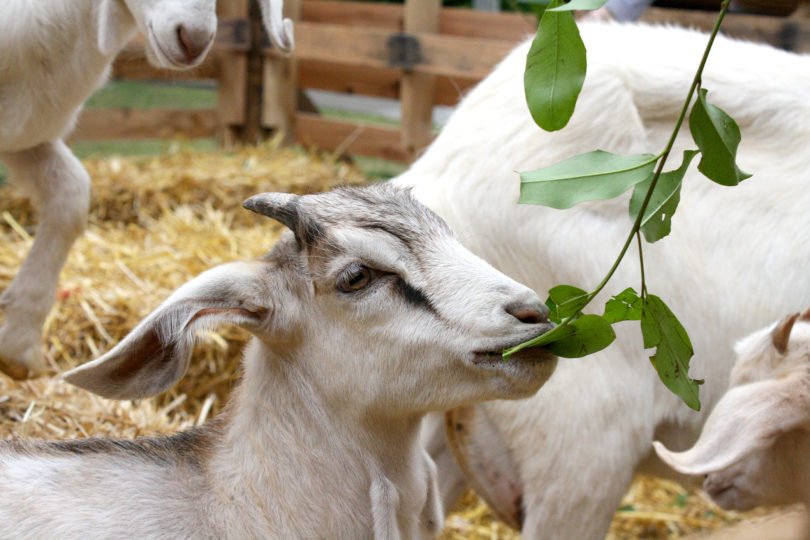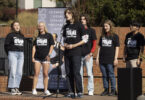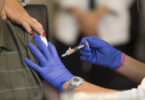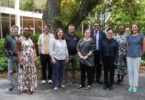Athens, Ga. – The Tanyard Creek Chew Crew goat herd will continue their foraging work on the University of Georgia campus this spring, and a “Welcome Baaa-ck Chew Crew” event will be held March 25 at 5:30 p.m. at the goats’ pen near next to the Hull Street parking deck.
The welcome celebration will feature the arrival of Junior, Sylvester, Wickett, Goatis Redding, and the other Chew Crew goats. The event will be one of several opportunities for the UGA community to learn about urban water quality, invasive plants, and prescribed grazing while interacting with the crew this spring. Earth Fare will provide refreshments and other support for Chew Crew events.
During the end of March and through the month of April, the goats will help restore the ecological quality of the creek by munching away at the kudzu, English ivy, privet and other invasive plants that cover the stream banks on Tanyard Creek, a stream that flows through the UGA campus.
In preparation for the herd’s return, a two-day “Botany Blitz” will be held March 22-23 to inventory the plant species and monitor water quality at the Tanyard Creek prescribe grazing site. All interested community members are encouraged to participate. No previous experience or botanical expertise is required. Volunteers will be guided by Eric MacDonald, an associate professor, in the College of Environment and Design, and Elizabeth King, an assistant professor in the Odum School of Ecology and the Warnell School of Forestry and Natural Resources. Students in the Society for Conservation Biology also will be on hand to help.
Volunteer workdays at Tanyard Creek will be March 31, April 8, April 16, and April 24 from 4-6 p.m. beginning near goats’ pen. Volunteers are invited to help the crew by picking up garbage, sowing native plant seeds to help stabilize the soil, and cutting invasive vegetation that is too tall for the goats to reach on their own.
On April 5, the Chew Crew will also make an appearance at Plantapalooza!, a celebration and sale of native and traditional plants sponsored by the State Botanical Garden of Georgia, along with the UGA Horticulture Club and the UGA Trial Garden. From 6-9 p.m., the crew will appear at the Invasive Species Hog Roast and Art Show, a fundraiser and educational event sponsored by UGA student members of the Society for Conservation Biolog. The event will be at Flinchum’s Phoenix, 650 Phoenix Road in Athens. Tickets to the hog roast and art show may be purchased at the door, or in advance at www.uga.edu/scb.
On April 22, the Chew Crew also will be on hand at this spring’s Earth Day celebration at the Tate Student Center.
The Chew Crew is part of an experiment in prescribed grazing, a technique that uses livestock to remove invasive, non-native plants from forests and stream banks. The project began in 2012 with a proposal by College of Environment and Design student Zach Richardson, which was funded by a Campus Sustainability Grant from the UGA Office of Sustainability. Since then, the crew and its human helpers have been deployed along the creek for two four- to six-week grazing periods per year-once during the spring, and again during the fall.
For the spring 2014 semester, Erin Lipp, an associate professor in environmental health sciences, and Keri Lydon, a graduate student of the College of Public Health, are coordinating water quality research at the Tanyard Creek site. This work involves students enrolled in Special Problems in Environmental Health Science (EHSC 3700) and Internship in Environmental Health Science (EHSC 3910), as well as assistance provided by the Upper Oconee Watershed Network, UGA Office of Sustainability and Athens-Clarke County.
For more information about the Tanyard Creek Chew Crew, contact MacDonald at eamacdon@uga.edu. For information about Chew Crew volunteer opportunities, contact Breanna Crowell, UGA Office of Sustainability watersheds intern, at breannac@uga.edu. For information about the UGA College of Environment and Design, see www.ced.uga.edu. For information about the UGA Office of Sustainability, see http://sustainability.uga.edu/.








